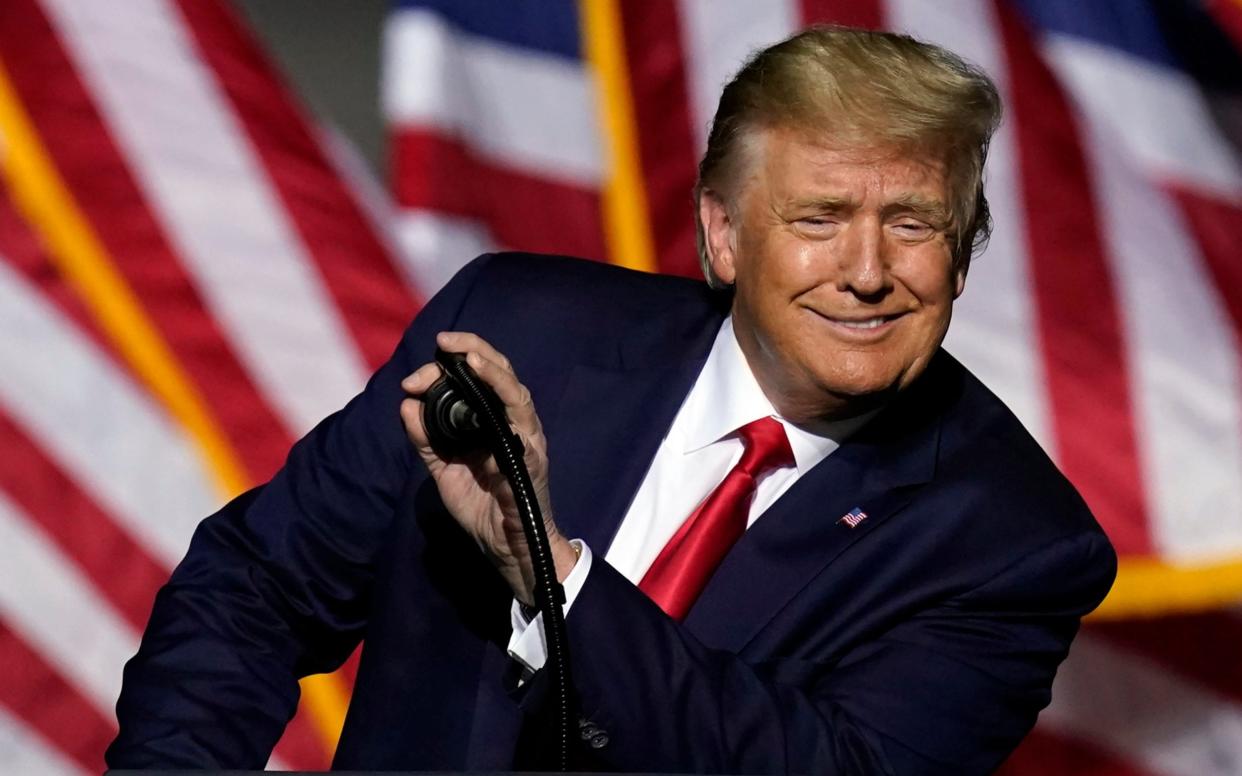Analysis: Trump's Supreme Court pick triggers battle for Catholic voters

For those gaming out how the battle to fill the open Supreme Court seat could impact the presidential election, one voting bloc has jumped out: Catholics.
They are a critical constituency in the states likely to decide the result, with many Irish and Italian Catholics in the mid-western states Donald Trump flipped in 2016 - Pennsylvania, Michigan, Wisconsin - and sizable Hispanic populations in Florida and Arizona.
They are also a group who Mr Trump did well with at the last election. He won a majority of Catholic votes then, according to polling analysis, but is struggling to replicate that this time round as he faces an Irish Catholic schooled by nuns: Joe Biden.
Trump's Supreme Court judge pick, 48-year-old Amy Coney Barrett, calls herself a “faithful Catholic”. In a now often-quoted comment, she once said her legal career was “a means to an end”, adding “that end is building the Kingdom of God”.

Focus has also fallen on her reported membership of a Christian group called People of Praise. The group used the term "handmaid" for its female leaders until 2018, when it was ditched due to the popularity of the dystopian TV series The Handmaid’s Tale.
Could picking a Catholic to fill Ruth Bader Ginsburg’s seat help draw votes to Mr Trump? The issues likely to come before the court in the coming years have left Republicans hoping so.
For one, there is abortion - a deep dividing line between the two political parties. Securing this confirmation before the election, as is expected given only two Republican senators have voiced opposition to a speedy process when four rebels are needed, would mean Mr Trump has appointed three justices in his first term.
Already the nine-justice Supreme Court has a 5-4 conservative majority. Success on this nomination would make it 6-3, meaning there is now a real possibility of overturning the landmark ruling in 1973 that underscored a woman’s legal right to abortion, Roe v Wade.
There are a whole plethora of other likely areas where the law could be tipped towards traditional Catholic thinking thanks to Mr Trump’s picks, such as the role of faith in the workplace and fund-raising freedoms for the church.
The more even-handed of Mr Trump’s religious supporters have often made a clear-eyed argument for supporting him.
Yes, a thrice-married man who rarely attends church and does not exactly embody the “turn the other cheek” Bible teaching may appear a strange choice to weigh in behind, they say. But look not at his personality but his policies.
It is here where the Supreme Court is so significant. Mr Trump could be out of office by January. He will certainly be gone by 2025. But the justices he is appointing will likely still be shaping the country by the 2040s.
With the confirmation process dominating the news agenda for the next five weeks this will not go unnoticed by Catholic voters as they weigh up who they want having that appointment power for the next four years.
There is, however, a critical complicating factor: Joe Biden. Mr Biden is an Irish Catholic. He was schooled by nuns. His father-in-law did not want him marrying his daughter because of his religion.
Today he attends church regularly, often carries a rosary and sometimes crosses himself in half-jest before saying something controversial. He would be America’s second ever Catholic president, after John F Kennedy.
Mr Trump appears aware of the political danger. He has claimed, wildly, that Mr Biden is “against God” and would “hurt God”. At the Republican convention last month Lou Holtz, a famous American Football coach, said Mr Biden was “Catholic in name only”.
Outside groups have piled in too. One called Catholic Vote has spent millions on attack adverts in the swing states, with one accusing the Democratic presidential nominee of “sacrificing his Catholic values to kneel before the leftist mob”.
Mr Biden, who moved to a more pro-choice position on abortion before this year’s Democratic primaries, has always pushed back on such swipes. In 2005 he said: “The next Republican that tells me I’m not religious, I’m going to shove my rosary beads down their throat.”
Come election day, Mr Trump may not be carrying a rosary. But in all likelihood he will be able to point to a third of the justices on the Supreme Court bench and say 'I put them there, vote for me and I'll do it again'.
For many Catholic voters, that could be a more powerful motivator.



